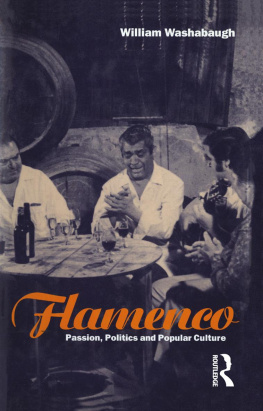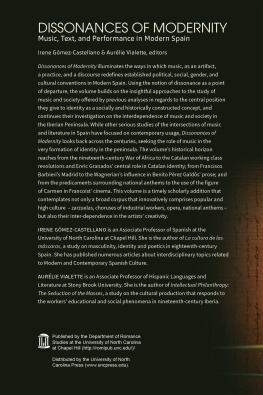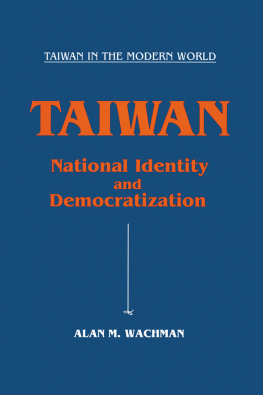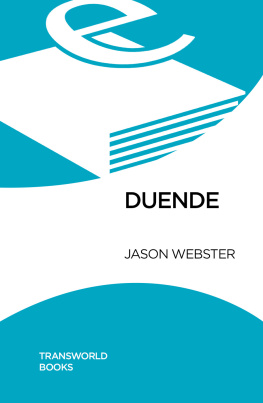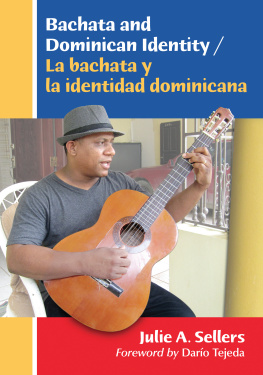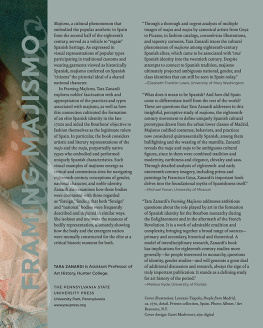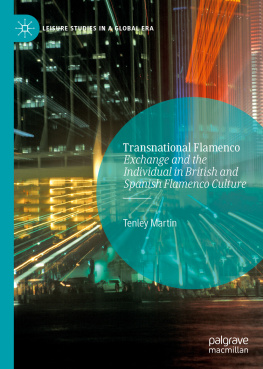Flamenco
EXPLORATIONS IN ANTHROPOLOGY
A University College London Series
Series Editors: Barbara Bender, John Gledhill and Bruce Kapferer
Flamenco
Passion, Politics and Popular Culture
William Washabaugh
First published 1996 by Berg Publishers
Published 2020 by Routledge
2 Park Square, Milton Park, Abingdon, Oxon OX14 4RN
605 Third Avenue, New York, NY 10017
Routledge is an imprint of the Taylor & Francis Group, an informa business
William Washabaugh 1996
All rights reserved. No part of this book may be reprinted or reproduced or utilised in any form or by any electronic, mechanical, or other means, now known or hereafter invented, including photocopying and recording, or in any information storage or retrieval system, without permission in writing from the publishers.
Notice:
Product or corporate names may be trademarks or registered trademarks, and are used only for identification and explanation without intent to infringe.
Library of Congress Cataloging-in-Publication Data
Washabaugh, William.
Flamenco: passion, politics, and popular culture / William Washabaugh.
p. cm. -- (Explorations in anthropology)
Includes bibliographical references (p. ) and index.
ISBN 1-85973-171-6 (HB : alk. paper). -- ISBN (invalid) 1-85973-178-6 (PB : alk. paper)
1. Flamenco music--History and criticism. I. Title. II. Series.
ML3712.W37 1996
781.62610468--dc20 | 96-23798 CIP MN |
British Library Cataloguing-in-Publication Data
A catalogue record for this book is available from the British Library.
Typeset by JS Typesetting, Wellingborough, Northants.
ISBN 13: 978-1-8597-3171-0 (hbk)
ISBN 13: 978-1-8597-3176-5 (pbk)
Contents
This study could not have been accomplished without the generous assistance of Jos Mara Velquez-Gaztel, Romualdo Molina, Mario Gmez Martn, Pedro Turbica, Paco Lira (both father and son), Gerhard Steingress, Jos Mara and Alfonso Eduardo Prez Orozco, Adrian Shubert, Stanley Payne, Gerard Flynn, Brook Zern, Toms de Utrera, Richard Pinnell, The Program for Cultural Cooperation between Spains Ministry of Culture and United States Universities, Robert Jones and the UWM Library, Jim Parakilas, Pedro Fernndez Gimnez, David Monroe, Aldis Strazdins, and, most importantly, Catherine Washabaugh. I hope that my writing does not fail to show them the gratitude and respect which they deserve. Finally, let me acknowledge with gratitude the permissions granted for the publication of , a revision of an essay originally offered in Popular Music.
Flamenco music is recognized by people all over the world. From New York to Tokyo, enthusiastic crowds have acknowledged the power of Paco de Lucas guitar and have responded to the passion of flamenco dance, whether in the self-controlled movements of Antonio Gades or in the vintage style of Carmen Amaya, with her inexhaustible passion and penetrating stare. Familiar too, though less so, are the songs really the wails that ground both the instrumentation and the dance. These flamenco songs, woven around Haiku-like verses, form the core of the music. Packaged together, the voice, the dance, and the guitar constitute this highly visible and easily distinguished style of popular music.
In North America, flamenco enthusiasts gather their rough-and-ready knowledge of the flamenco style from a variety of sources. Books of many stripes have helped to shape popular knowledge. Guitarists playing both conservative sounds, like Pedro Bacan, and fusion sounds, like Ottmar Liebert, have helped to make flamenco guitar artistry as recognizable as it is. Films from Carmen to Strictly Ballroom have played up different features of the flamenco style, and flamenco performance groups in many American cities put time and sweat into educating and edifying the American public.
Despite or because of this welter of influences, reactions to the style are sharply contrastive. Americans either love it or they hate it. Few people are lukewarm. Ambivalent reactions are rarer still. Some folks celebrate the flamenco style as if were a gospel, a sacred text and a holy ritual all rolled into one. Other folks regard it as if it were the quintessence of kitsch. They find it noisy, gaudy, frivolous and inane.
These rifted reactions suggest something of the importance of flamenco as a cultural phenomenon. Flamenco performances are cultural moraines. They are gathering places for not-yet-well integrated cultural forces. They present divergent messages, and, inevitably therefore, they generate divergent reactions, producing a welter of different impacts on both the artists who perform and on the audiences who enjoy their performances. It is for these reasons that the flamenco style is apt for anthropological study. Its performances are tell-tale signs of social processes, processes central both to Spanish social life and to modem life wherever it is lived. It is as if all the central and most general contradictions of modernity had been heaped together, boiled down, and condensed into a singers cry and a listeners response.
Most scholars have reduced the moraine of flamenco to manageable singularities. Flamenco is just this. Flamenco is simply that. Most such efforts, however, limp because they are too general, too abstract and too much driven by a passion for the art. What else can one say about the claim that flamenco song liberates one from the claws of time and history (see Grande 1992a) or that the hands of Paco de Luca have surpassed the humble condition of the human body and have entered into the realm of immortality (Grande 1986)? Clearly, such generalizations are simplistic, being the result of efforts to stand above the whole tradition and to summarize it from the top-down. Top-down methods, as I will call them, tempt one to define a style in terms of its origin and evolution, as if contemporary performances were reincarnations of past realities. As a result, top-down interpretations look to clarify genres from their origins to their present conditions, describing evolutionary processes and periodizing stages of development, thereby making it possible to isolate the different historical threads that get knotted together in contemporary experiences. The major problem raised by such top-down interpretations is abstract objectivism. As Mikhail Bakhtin and his colleagues have noted, something is wrong with any interpretive method that reifies genres and objectifies abstractions to the point that events in the present are reduced to reflections of the past. Top-down approaches to music are guilty of such abstract objectivism to the degree that they pursue questions of origin and development while neglecting the significance of contemporary performances.
This then is the challenge faced by this book: to find the forest of flamenco without getting hung up in the trees, yet to do so without losing sight of the fact that flamenco music is continually being made in the present rather that inherited from the past. The appropriate analytic attitude is one that sees flamenco reality to be always realized in performance, and always approached as an ever-emerging reality. Every next performance restructures all that has preceded. Though a melody or a lyric or rhythm may seem to be passed down from past artists, it always undergoes transformation in the course of being performed. It is recreated in and through the novel contexts of its production and audition a condition that is as true of recorded music as it is of live performance. The new contexts in which we listen to old disks help to recreate musical style. Each moment of music carries on a tacit dialog which lies embedded in the complex circumstances in which it occurs (Chanan 1994: 42).

